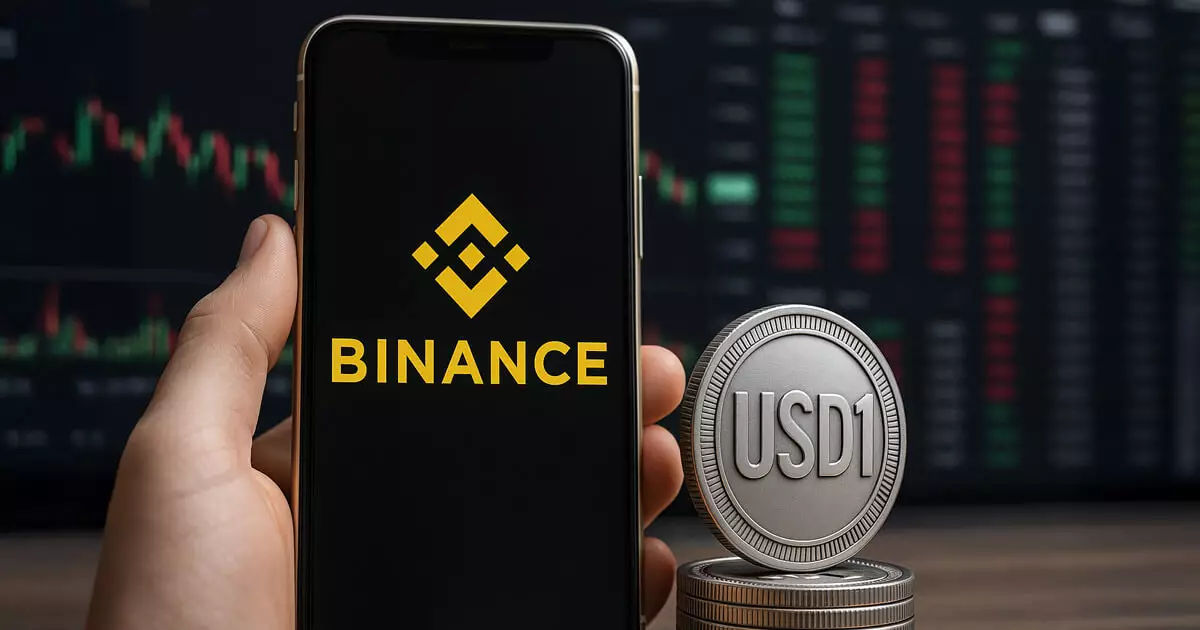In an intriguing, yet unsettling revelation, the murky relationship between cryptocurrency entities and high-level political figures takes center stage. At the heart of this controversy is Changpeng Zhao, the once-renowned Binance CEO, whose clandestine dealings suggest a far deeper involvement with powerful political families than previously acknowledged. The allegations indicate that behind the façade of a decentralized blockchain universe, there exists an intricate web of influence that undermines the very principles of transparency and free markets. This isn’t merely a matter of corporate misconduct; it’s a reflection of how modern financial innovations can be exploited to serve personal political ambitions and clandestine wealth accumulation.
The alleged backing of a stablecoin, USD1, by Binance—a giant in the crypto sphere—raises serious questions about the potential conflicts of interest. The report claims that Binance played a pivotal role in creating the smart contracts for USD1, a token linked to entities tied to the Trump family. When a private company’s code underpins a stablecoin used in a multi-billion-dollar transaction, the lines between legitimate commerce and political leverage become dangerously blurred. It suggests a game where influence is currency, and the roles of key players reveal a clear pattern of favoritism that could destabilize the broader economic landscape.
Furthermore, the fact that an overwhelming majority—around 90%—of the stablecoin’s supply resides in Binance-controlled wallets underscores the risk of centralization, even within seemingly decentralized frameworks. This concentration of power hints at a potential monopoly, where a few actors could sway markets, influence political ties, or manipulate reserves—holding not just financial heft but also strategic leverage over an entire ecosystem. The apparent promise of a lucrative income stream, estimated at $30 million annually for the Trump family from the stablecoin’s interest yield, compounds concerns about how financial interests intertwine with political loyalties.
The Shadows of Influence and the Question of Integrity
The denials from Binance and the Trump administration hardly dispel the shadows cast by these revelations. Zhao’s plea for a presidential pardon, in light of his prior legal issues related to anti-money laundering violations, raises questions about the integrity of legal and financial institutions in a climate where influence and wealth often appear to go hand-in-hand. The mention of Zhao’s personal pursuit of a pardon, coupled with allegations of secret meetings with Trump allies, suggests that personal ambitions may be driving a larger strategy aimed at consolidating financial and political power.
Ethics experts’ warnings about conflicts of interest resonate profoundly in this scenario. Richard Painter’s comparison to a Civil War-era anomaly—an officeholder whose personal financial interests overshadow their official duties—illustrates a concerning trend in the modern political landscape. Although the Trump administration claims that no conflicts are in place, the very structure of trust arrangements and the flow of crypto funds—whose value increases by hundreds of millions—cast doubt on the sincerity of those assertions.
The notion that crypto projects tied to Trump might have added at least $620 million to his wealth in recent months signals a broader phenomenon: the use of emerging financial technologies as personal wealth accelerators under the guise of innovation. Such developments threaten to hollow out the integrity of both financial markets and political processes, turning what should be a level playing field into a playground for the well-connected.
A Symbiotic Relationship that Threatens Democratic Values
Ultimately, this saga exposes the perilous symbiosis between crypto entrepreneurs and political power. The alleged mutual benefits—ranging from financial gains to potential political favors—highlight a disturbing pattern where influence is commodified and markets are compromised. While proponents of crypto vow decentralization, these allegations reveal that in practice, financial clout remains concentrated among a few strategic insiders, undermining the very ideals of free enterprise and fair governance.
The proposed plans for a new stablecoin by World Liberty Financial, and the possible transfer of assets to Trump’s family through allies like Steve Witkoff, symbolize an ecosystem where wealth and influence seamlessly intertwine. This all but guarantees that political allegiance and economic power are becoming inseparable in the shadows, threatening to erode public trust in democratic institutions, regulatory oversight, and the rule of law.
The ongoing narrative underscores a harsh truth—what appears to be the frontier of financial innovation is, in reality, a battleground for influence, control, and unchecked ambition that risks subverting democratic values. This isn’t merely about legality; it’s about safeguarding the integrity of a system designed to serve the common good, not personal or partisan enrichment. As the specter of influence peddling looms large, the question remains: is the essence of true financial independence still intact, or has it been consumed by a grossly asymmetrical power structure? The answers—however veiled—are vital to the future of economic sovereignty and democratic accountability.


















Leave a Reply